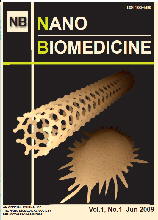
Nano Biomedicine
ORIGINAL ARTICLE
Effects of Alzheimer's Disease on the Ability of Titanium Surface to Induce Hard Tissue Differentiation
Tetsuji KUSUMOTO1, Seiji TAKAO2, Zeng YUHAO2, Yang YUANYUAN2, Li MIN2, Yan SIFAN2, Yuichiro TASHIRO2, Satsuki YAMAMOTO2, Shigeki YOSHIMINE2, Hirsohi NISHIZAKI2, Joji OKAZKI2, Yutaka KOMASA1, and Satoshi KOMASA2
1Faculty of Health Sciences, Osaka Dental University, Osaka, Japan
2Department of Removable Prosthodontics and Occlusion,
Osaka Dental University, Osaka, Japan
Nano Biomed 2020; 12(1):11-18, (Jun 30, Nano Biomedicine)
Synopsis
Alzheimer's disease is a progressive brain disorder that affects areas of the brain that control cognitive functions and memory, and the number of patients in Japan is increasing. It is important for dentists to improve the oral quality of life of Alzheimer's patients, but for that, it is necessary to know the pathology of Alzheimer's disease. In this study, we examined the effects of Alzheimer's disease on the initial adhesion of bone marrow cells and the ability to induce hard tissue differentiation. Bone marrow mesenchymal cells extracted from the femurs of 7-week-old SAM mice and C57BL / 6 mice were seeded on titanium surface. When various markers related to the initial adhesion of bone marrow cells and the ability to induce hard tissue differentiation were examined, SAM mice showed low values at all measurement times. In addition, strong expression of TNF-α was observed in bone marrow cells of SAM mice seeded on titanium surface.In conclusion, it was revealed that when the bone marrow cells of the Alzheimer model mouse were seeded on titanium surface, the initial adhesion and the ability to induce hard tissue differentiation were reduced, and the hard tissue formation was inhibited.
Key words: Alzheimer's disease; implant; bone marrow cells
All documents in this paper (Free)
J-Stage https://www.jstage.jst.go.jp/article/nano/12/1/12_11/_article
DOI https://doi.org/10.11344/nano.12.11
Alzheimer's disease is a progressive brain disorder that affects areas of the brain that control cognitive functions and memory, and the number of patients in Japan is increasing. It is important for dentists to improve the oral quality of life of Alzheimer's patients, but for that, it is necessary to know the pathology of Alzheimer's disease. In this study, we examined the effects of Alzheimer's disease on the initial adhesion of bone marrow cells and the ability to induce hard tissue differentiation. Bone marrow mesenchymal cells extracted from the femurs of 7-week-old SAM mice and C57BL / 6 mice were seeded on titanium surface. When various markers related to the initial adhesion of bone marrow cells and the ability to induce hard tissue differentiation were examined, SAM mice showed low values at all measurement times. In addition, strong expression of TNF-α was observed in bone marrow cells of SAM mice seeded on titanium surface.In conclusion, it was revealed that when the bone marrow cells of the Alzheimer model mouse were seeded on titanium surface, the initial adhesion and the ability to induce hard tissue differentiation were reduced, and the hard tissue formation was inhibited.
Key words: Alzheimer's disease; implant; bone marrow cells
All documents in this paper (Free)
J-Stage https://www.jstage.jst.go.jp/article/nano/12/1/12_11/_article
DOI https://doi.org/10.11344/nano.12.11